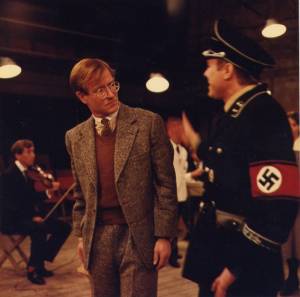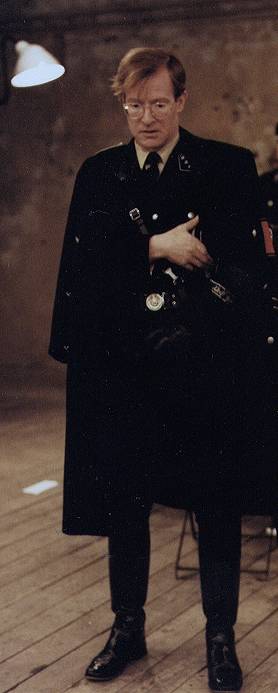Good couldn't be better
showing man at his worst
How did it happen? How did a nation go mad? How were
normal people transformed into brutes, devoid of ordinary humanity? How were
the Nazis made?
|

Hitler's own anti-semitism is clinically
explicable. But after he had ordered the mass extermination of Jews, how did he
get apparently normal Germans to carry those orders out?
The questions are asked and some answers given
by C.P. Taylor's wonderful play, Good, which the Royal Shakespeare
Company brought triumphantly to the Booth Theater last night. This is a play
for the mind and heart, an incandescent evening in the theater that lights up
the conscience.
It is a play in which you are horrifyingly
asked to identify with the villain. And the villain of this trenchantly
anti-Nazi, anti-expediency play is not Adolf Hitler, nor is it Adolf Eichmann,
although both briefly appear. |
No, the villain is a mild-mannered professor of
German Literature - and we follow his fateful progress from university
classroom and muddled marriage to that chill morning in 1941 when he is met at
the railway station of Auschwitz by a frosty-eyed camp commandant and a brass
band. A real brass band.
Not that the author, who died soon after the play's
first London success last year, expects you actually to sympathize with his
double-dealing, alienated academic, John Halder. But he does insist that - Jew
or Gentile alike - you do see him not as some aberrant monster, a freak of
history, but as a man not entirely unlike yourself.
He has hands, organs, dimensions, senses, affections,
passions - he even needs the services of a psychiatrist. For Halder has "a bad
case of the bands."
His life is punctuated by the imaginary sounds of
music - maybe a military band, a drinking song, or perhaps Richard Tauber
singing a sentimental ballad. "Everything," he tells us, "is acted out against
a musical background."
This gives Taylor's play its formal structure. We are
on a bare stage - the anteroom, it might be, to a nightmare. The setting such
as it is - conceived with spartan imagination by the designer, Ultz - is
nothing but an old upright piano, a scattering of chairs and a battery of 84
lamps fixed on scaffolding as if in some lunatic lighting display.
There are 10 actors and six musicians. They amble on
to the rehearsal-like stage. And there they remain for the play's duration. It
is like a run-through for a play - but then so is Halder's life. Halder is
beguiled into first the Nazi party, and later made one with its horrors. He is
a weak man, who likes to feel he does good. As his second, madly Aryan wife
(Felicity Dean) says at the end, "If we do good to each other....." But
he is magnetically attracted to the line of least resistance.
He writes a novel making a case of euthanasia. He
delivers lectures on the adverse effects of Jewish humanism on European
literature. He is a sitting duck for party propagandists.
His first motives are to join the Nazis and "push
them to humanity." After all his psychiatrist, Maurice is a Jew, and he regards
him as his "closest friend, my only friend."
But this ex-soldier from World War I, is as alienated
as perhaps the whole post-Versailles German nation is alienated. He says, "I do
everything other people do - but I don't feel it's real."
|
Yet he can still say - with a joy for
conformity and a pleasure in pomp: "It is a terrible thing, but a wonderful
thing, to get into a uniform." Halder gets into a uniform, finding that the
primrose path to the holocaust is paved with good intentions.
This is not a rationale for the whole German
race - merely an objective case history of one man. An unusual man. A man as
unusual as we all are - to ourselves.
Howard Davies' direction of the play - he has
been with it since it started in the RSC's small London theater, the Warehouse
- is unerringly unobtrusive. He subtly and sensibly permits Halder, as played
by the brilliantly, carelessly virtuoso Alan Howard, to be unerringly
obtrusive.
With every superbly calculated mannerism Howard
is insisting that the play, like its music, is taking place in his mind. It is
a concept remarkably conveyed.
Howard himself has a lovely air of myopic
gentleness. With his rimless glasses, his head perpetually held on one side,
his mouth slanted, and his expression caught in some eternal freeze of
surprise, Howard creates in living, breathing portrait a man almost likeable
but wholly despicable.
The rest of the cast encircle him with their
own anxieties as characters and skills as actors. Even the musicians are part
of the play's unbroken, dream fabric.
The RSC company is different from the London
cast, although Howard himself goes from strength to strength. The rest,
including notably, Gary Waldhorn, Pip Miller, Nicholas Woodeson and Kate Spiro,
recreate the awful images of a dirty fantasy. |

|
One is reminded of Goya's inscription on his etchings
Los Caprichos. "The dream of reason produces monsters." Here is one
man's dream of reason.
Clive Barnes.
New York Post, 14.10.1982.

